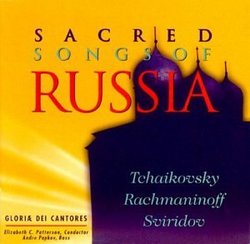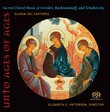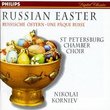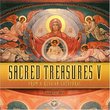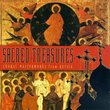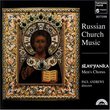CD Details
All Artists: Gloriae Dei Cantores, Andre Papkov, Dimitry Stepanovich Bortnyansky, Pavel Grigor'yevich Chesnokov, Mikhail Glinka, Alexandr Dmitriyevich Kastalsky, Nikolai Sr Kedrov, Sergey Rachmaninov, Stepan Smolensky, Georgy Vasilevich Sviridov, Pyotr Il'yich Tchaikovsky, Vasily Polikarpovich Titov, Znamenny Chant, Elizabeth C. Patterson, Alexander Andreyevich Arkhangel'sky
Title: Sacred Songs of Russia
Members Wishing: 0
Total Copies: 0
Label: Gloriae Dei Cantores
Original Release Date: 1/1/1999
Re-Release Date: 4/6/1999
Album Type: Import
Genres: Special Interest, Classical
Styles: Opera & Classical Vocal, Historical Periods, Baroque (c.1600-1750), Classical (c.1770-1830), Early Music, Sacred & Religious
Number of Discs: 1
SwapaCD Credits: 1
UPC: 709887010026 |
Synopsis
Album DescriptionOver the past thousand years, Russian composers have created an immensely rich and varied body of choral music and chant to express the sacred texts of the liturgy. Sacred Songs of Russia portrays the musical legacy of the Russian people, which comes as a response to the depth of their faith. Among the noteworthy works on this recording, which contains previously released material, are two stirring works by Rachmaninoff including Bogoroditse Devo (Rejoice, O Virgin) from his All Night Vigil, opus 37, and V molitvah (The Mother of God, ever-vigilant in prayer). Perhaps most significant are the Three Choruses of Georgy Sviridov (1915-1998), composed during a time when sacred music was still actively suppressed by the Soviet regime. The three works by Peter Tchaikovsky, Milost' mira (A Mercy of Peace), Angel Vopiyashe (The Angel cried), and Hymn in Honor of SS. Cyril and Methodius, are also strong statements of the Russian faith and expression through music. | Gloriæ Dei Cantores first toured Russia (then part of the U.S.S.R.) in the spring of 1990 to re-introduce Russian sacred choral music to their concert halls for the first time since the Russian Revolution of 1917, and participated in several liturgies of the Russian Orthodox Church. At the request of Metropolitan Alexy of Leningrad, now Patriarch of Moscow and all the Russias, Gloriæ Dei Cantores toured Russia a total of three times, returning in 1992 and 1998 to sing in Moscow, St. Petersburg, and throughout the Golden Ring. Gloriæ Dei Cantores were also among the first Western artistic groups to tour Siberia.
Similar CDs
| |
CD Reviews
The Mother Lode Vladimir Berezansky, Jr. | Moscow, Russia | 12/13/2005 (5 out of 5 stars) "If you are looking for a comprehensive survey of the best of the Russian Orthodox liturgical tradition, your search is over. This is the mother lode. First point: I must admit to being something of a purist, and I was at first skeptical that an American choir could perform music of this genre so convincingly; but hearing is believing. Yes, they clearly have included a few honest-to-God Russian basso ringers (and maybe one or two altos); but this is an American choir performing Russian Orthodox liturgical music the way it's supposed to sound - only better. Second point: The selection of pieces is fabulous. This choir's artistic director, Elizabeth C. Patterson, consulted with Vladimir Morosan, the Last Word on the Russian Orthodox choral tradition. The results of this collaboration are reflected in both the breadth and quality of pieces selected. This is literally a millennium of music, beginning with a sample of ancient znamenny chant and ending with three stunning meditations by the late Georgiy Sviridov. Each selection is both accessible and interesting, and a prime example of its composer and/or period. Third point: The individual pieces, with very few exceptions (such as No. 3, Rakhmaninov's `Ave Maria'), are NOT the most well-known and frequently performed warhorses of the Russian Orthodox liturgy. This is not a `Top Ten' recording. That makes this collection all the more interesting. In at least one instance (No. 15, the other Rakhmaninov offering) this may be the only recording available if you're not prepared to dig deep in the discography archives of several dozen universities and conservatories. Fourth point: This is not a new recording, but it marks a standard of quality that few performers in this genre - including native Russian choral ensembles - have since met or surpassed. Elizabeth Patterson has an innate feel for this music. In her previous life, she must have been a Russian monk. Final point: For serious musicians, musicologists and aficionados, this is a perfect gateway to a deeper understanding of this tradition. Buy it!"
|
